Algerian National Navy
Italian training ship Amerigo Vespucci#/media/File:Amerigo vespucci 1976 nyc aufgetakelt.jpg
| Algerian National Navy القوات البحرية الجزائرية | |
|---|---|
| Active | 1516 – Present |
| Country |
|
| Branch | Navy |
| Size | 17000 personnel [1] |
| Garrison/HQ | L'AMIRAUTE, Algiers |
| Anniversaries | February 2, 1967 |
| Equipment | 80 vessels, 30 helicopters, 02 MPA Aircraft |
| Commanders | |
| Current commander | Mohamed-Larbi Haouli |
| Insignia | |
| Naval Ensign |
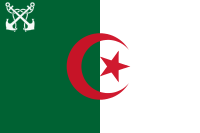 |
| Naval Jack |
 |
The Algerian National Navy (ANN; Arabic: القوات البحرية الجزائرية) is the naval branch of the Military of Algeria. The navy operates from multiple bases along the country's nearly 1,000 km (620 mi) coastline, fulfilling its primary role of monitoring and defending Algeria's territorial waters against all foreign military or economic intrusion. Additional missions include coast guard and maritime safety missions as well a projection of marine forces (fusillers marins). Algerian forces are an important player in the Western Mediterranean.
As with other Algerian military branches, the navy was built and structured with assistance from the Soviet Union during the Cold War, but has also relied on other sources for equipment in some areas. Since the end of the Cold War, Russia has remained an important partner, but Algeria has increasingly sought additional sources for equipment as well as building its own shipbuilding capacity.
history
The Algerian Navy played an important role in the western Mediterranean between the sixteenth and eighteenth centuries, where she was a leading military force that ensured not only the defense of the Regency of Algiers but also of international ships making a passage through the Mediterranean, led notably legendary sailors such as Barbarossa brothers or Kheir Edine and Hassan Agha.
The origins of the Algerian Navy (1147 - 1516))
At that time the Maghreb under the control of the Almohad dynasty which also ruled the current Spain "al-Andalus" and 1147 to 1269. The Navy was born with the installation by Abd El Moumen naval shipyards the Almohad empire in the ports of Oran and Honaine. But the reign of this great dynasty would soon be glazed at first by a few internal disagreements, mainly related to the difficulties of managing a vast territory. The situation worsened further when a part of the Iberian peninsula again passed under the control of Christian rulers in the wake of the Battle of Las Navas de Tolosa, the decomposition of the kingdom accelerated with the formation of three states in North Africa. After the total destruction of the kingdom Almohad in 1269 began a fierce battle between Muslims and Christians for control of various ports in the Western Mediterranean, this has resulted in the occupation by the Spanish in several regions algcomme The Peñon of Algiers, Oran and Bejaia, which led the indigenous peoples of these regions to call on pirates to free the Christian invaders, which was done through sending and Aroudj Hayreddin Barbarossa brothers in 1516, they managed to build a fleet.

The privateer Oruç Reis, eldest of Khayr ad-Din
Described by some historians as the greatest pirates in history, the Barbarossa brothers would probably Albanians, several hypotheses are cited in this regard but none of them have been confirmed definitively, however, the general trend that emerges from the various historical references tends to reinforce the former. In the description given to them, It is said that the youngest Kheire Edine was brighter and stronger corpulence as its big brother while Aroudj Kheir Edine was known for his knowledge in navigation and maritime battles, he was nicknamed Barbarossa . He engaged in piracy for the sole purpose of revenge crossed, especially following his imprisonment for several years in the jails of the Christian rulers, courage and great skill allowed him to escape, fleeing afterwards to Tunis where King Mohamed Ibn Hafss allowed him to build a naval base from which he managed to be the first steps of its military fleet. He moved later to head its fleet to Algeria to its liberation from the Spanish colonization. What he managed to do by releasing initially Algiers, which he conferred the status of capital of a new Algerian state, several years later, he reunites his fleet and left immediately to conquer the last bastion Spanish in Algeria Mers El Kebir, he managed to free.
Phase of construction and consolidation
After the liberation of all the regions that were under Spanish influence, it was therefore quite possible to consider the construction of the Algerian navy, which was undertaken by building initially of four small ships war, over time, a real military industry was born through several shipyards (especially in Cherchell, Bejaia and Algiers) who provided the Algerian Navy a considerable number of warships equipped with cannons developed entirely by skills Algerian. From there a new page was opened for Algeria which through its Marine could impose its leadership in the Mediterranean for nearly three centuries.
This rule also allowed him to repel several attacks from a number of European countries, starting with the one that was led by Charles V in October 1541, the troops of the latter were severely defeated by the Algerian fleet which was then under the command Hassan Agha, other attacks were carried out by the Spaniards in the 16th and 17th centuries, but they were all rejected by the Algerian Navy.
Other attacks of importance, the American expedition of 1815 and one that led the British and Dutch Marines on Algiers in August 1816, the latter suffered great losses and were prevented from landing at Algiers. However the Algerian armada also lost a large number of vessels.



In 1827, Algeria walked almost all of what was left of its vessels to rescue the Ottoman navy threatened by French, Russian and British coalition during the war of independence of Greece. A naval battle of extreme ferocity took place in a region called Navarino, and during which the Algerian navy lost the bulk of its combat fleet. After this ordeal, Algeria lost almost all his defenses and had become vulnerable to any foreign attack. [2] Three years later Charles X launched into a naval blockade and then in a military expedition against Algiers which finally fell in 1830. Algeria, endured for a century and 32 years of French rule until July 5, 1962, when the country regained its independence.
Bases
Principal naval bases are located at Algiers, Annaba, Mers el-Kebir, Oran, Jijel and Tamentfoust. Mers el Kébir is home to the OMCN/CNE shipbuilding facilities where several Algerian vessels have been built. Algeria's naval academy at Tamentfoust provides officer training equivalent to that of the army and the air force academies. The navy also operates a technical training school for its personnel at Tamentfoust.
Equipment
The bulk of the Algerian Navy is still based on Cold War designs, although work is being done to both acquire new platforms as well as modernize existing equipment. The surface fleet is equipped with a mixture of smaller ships well suited to coastal and Exclusive Economic Zone (EEZ) patrol work. The fleet is led by three Koni class frigates which have been updated with more modern systems. These are due to be augmented in the coming years by a pair of MEKO A-200 frigates which will represent the most modern equipment of the navy when they enter service, also, Algeria signed a contract with China Shipbuilding Trading Company for the construction of three light frigates about 2,800 tons full load. A mixture of six corvettes and off-shore patrol vessels complement the frigates, while a large number of smaller boats cover the role of coastal patrol. Algeria had maintained a relatively large fleet of Osa class fast attack craft by the end of the Cold War, but it is questionable whether any of these remain in operational use.
Algeria has had a small submarine presence in the Mediterranean with a pair of Kilo class patrol submarines, though the recent acquisition of an additional two upgraded boats will expand this presence significantly. Their amphibious warfare capacity has traditionally been limited with a small group of landing ships essentially for coastal transport roles. This capacity will be greatly upgraded with the planned acquisition of an amphibious transport dock capable of supporting more robust operations. In the area of civil support, the purchase of seagoing rescue tugs will mark the first ability of an African nation to provide valuable services to economic and commercial operators in the Western Mediterranean.
The Algerian military has long maintained a strong veil of secrecy over its organization and equipment, making an exact accounting of operational vessels difficult to ascertain. Open sources are known to vary widely in their reports of several aspects of Algerian equipment.
Submarines
| Class | Photo | No. | Ship | Year Commissioned |
Note |
|---|---|---|---|---|---|
| Kilo Class 636M | |
04 | 2009-2019 | [2][3]
[4][5][6] Two are active and two under construction , delivery starting in 2017. | |
| Kilo Class 877EKM | |
02 | Rais Hadi Mubarek Class | 1987 | Project 877EKM Paltus (Kilo) submarines built in Admiralty Shipyard in Saint Petersburg
modernized in 2009 , equipped with ClubS missile. |
Amphibious warfare vessels
| Class | Photo | No. | Ship | Displacement | Year Commissioned |
Note |
|---|---|---|---|---|---|---|
| Amphibious transport dock (1+1option) | ||||||
| Kalaat Béni Abbès Class |  |
1+(1) | Kalaat Béni Abbès | 9,000 tonnes | 2015 | Improved San Giorgio, Ordered in 2011(+1 in option)[7][8][9]' |
| Landing Ships (2) | ||||||
| Kalaat Beni Hammed | 472 | Kalaat Beni Hammed | 2,450 tonnes | 1984 | Built by Brooke Marine in Lowestoft, UK | |
| 473 | Kalaat Beni Rached | 2,450 tonnes | 1984 | Built by Vosper Thornycroft in Woolston, UK | ||
Surface combatants
| Class | Photo | No. | Ship | Displacement | Year Commissioned |
Note | |||
|---|---|---|---|---|---|---|---|---|---|
| Frigates | |||||||||
| MEKO A200 | 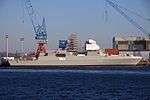 |
2+(2) | Arradie "Deterrent" | 3,700 tonns | 2016 | in Service (with an option for two more) [10] | |||
| C28A |  |
3+3 | Adhafir "Victorious" | 2,800 tonns | 2015-2017 | in Service + 3 new version of C28A on order[11] | |||
| Koni-class frigate |  |
3 | Rais Korfo | 2000 tonns | 1985 | Ex-Soviet SKR-129, re-fitted in 2000 at Kronshtadt, believed to have suffered an explosion 07 Dec 2015 while under overhaul at Kronstadt | |||
| Corvettes | |||||||||
| Project 20382 "Tigr" corvette [12][13] | 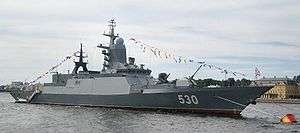 |
6[14] | 2200 Tonns | 2017[15] | Delivery starting in 2017. | ||||
| Nanuchka-class corvette[16] | 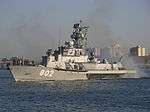 |
3 | Rais Ali | 660 tonns | 1982 | in service, Project 1234E built by Vympel Shipyards in Rybinsk, modernized in 2012. | |||
| Djebel Chenoua Class corvette | 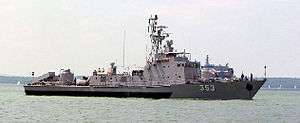 |
4 | El Kirch | 540 tonns | 2002 | Built by OMCN / CNE in Mers-el-Kebir, Algeria.
Armed with 4 C802 ASM and AK630 CIWS. | |||
| Patrol Boats | |||||||||
| Osa II class missile boat | 8 | 1978 | |||||||
| Kebir class patrol boat | 14 | El Yadekh | 250 | 1982 | the first two units built by Brooke Marine | ||||
| FPB98 MKI Ocea class patrol boat [17][18] | 21 | Denebi | 2008-2011 | built by Ocea France | |||||
| Mine countermeasures | |||||||||
| Lerici-class minehunter | 1(+2) | El-Kasseh 1 | 600 tonns | 2016 | in Service.[19] | ||||
Fleet auxiliaries
| Class | Photo | No. | Ship | Displacement | Year Commissioned |
Note |
|---|---|---|---|---|---|---|
| Survey ship | ||||||
| El Idrissi | 673 | El Idrissi | 540 tonnes | 1980 | Ship built by Matsukara Zosen in Hirao, Japan | |
| Training ship | ||||||
| Soummam | 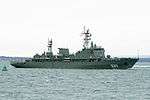 | 937 | Soummam | 5,500 tonnes | 2006 | 5500 tons (full load) |
| EL Mellah | 938 | El Mellah ( the sailor) | 110 meters | 2017 | A Three Mats tall ship constructed In Poland Gdansk | |
| Salvage ship | ||||||
| El Mourafik | 261 | El Mourafik | 600 tonnes | 1990 | Built in China | |
| High Seas Tow Vessel | ||||||
| El Mounjid | 701 | El Mounjid | 3,200 tonnes | 2012 | The Ships are type UT 515 CD built in Norway and Motorization buy Rolls-Royce. | |
| 702 | El Moussif | 3,200 tonnes | 2012 | |||
| 703 | El Moussanid | 3,200 tonnes | 2012 | |||
Aircraft
| Aircraft | Mission | In Service | Note |
|---|---|---|---|
| Helicopters | |||
| AgustaWestland AW101 | Search and rescue | 6 | Ordered in 2007, in service by 2011 |
| AgustaWestland AW139 | Search and rescue | 8 | Ordered in 2010, in service by 2014 |
| Super Lynx Mk.130 | Search and rescue | 4 | In service 2011. |
| Super Lynx Mk.140 | ASW | 6 ordered in 2012[21] | |
| Ka-32T | Maritime utility transport, search and rescue helicopter | 5 | In service 1996.[22] |
| Beechcraft King Air | Maritime patrol (operated by air force) | 2 | In service 2013.[23] |
Modernization
.jpg)
The Navy is currently being upgraded with the following technological developments: the existing units are being modernized, with the submarine force strengthened by two new Kilo class submarines(last generation).[24]
- One LPD form Italy in 2014.
- Four MEKO A200 fregates from germany.
- Three corvettes C28A with option of three more pruduced localy. Radar and electronic equipment will be supplied by Thales, and mounted in Algeria. They will be built at Hudong Zhonghua Shipyard.[25][26][27]
- Six tiger corvettes from russia.
- 21 units of the type FPB98 MKI Ocean Patrol Boat. [17][18]
- 12 units of Alusafe 2000 high speed rescue and patrol vessel. [28]
Gallery
Munitions
SAM
- Umkhonto (missile)[29]
- Aster (missile family)[30]
- HQ-7A (FM-90) - on board C28A Class Corvette .
- 9M33/SA-8 - Osa-M (SA-N-4) naval version for Koni (Mourad Rais) frigate
Anti-ship Missiles
- RBS-15 Mk. III [25][31][32] III will equip the two MEKO 200 frigates under construction for the Algerian National Navy. Delivery is scheduled for 2015-2016.
- SS-N-25 [25]
- C-802 [25]
- SSC-3 Styx [25]
- 3M-14E [25][33]
- P-900 Alfa
- SS-N-2C
Air to ground Missiles
- Mokopa - the Algerian Navy's six new Super Lynx 300-series helicopters are conducting flight tests armed with Mokopa anti-armour missiles.
- Raptor-2 Precision-Guided Glide Bomb series from south africa[22]
See also
References
- Notes
- Citations
- ↑ http://www.inss.org.il/upload/%28FILE%291311071604.pdf
- ↑ http://www.navyrecognition.com/index.php?option=com_content&task=view&id=627
- ↑ http://vpk-news.ru/news/2509/
- ↑ http://lenta.ru/news/2012/09/19/subs/
- ↑ http://www.armstrade.org/files/analytics/315.pdf
- ↑ http://www.km.ru/economics/2012/09/19/692626-alzhir-zakazal-rosoboroneksportu-dve-podvodnye-lodki#.UFsuP5Fc3CM
- ↑ "Italian shipyard Fincantieri launched Algerian Navy future amphibious ship (BDSL program)". January 10, 2014.
- ↑ Le nouveau bâtiment de projection algérien, meretmarine.com 13/09/2012
- ↑ "Italian shipyard Fincantieri delivered amphibious ship Kalaat Beni-Abbes to Algerian Navy". September 7, 2014.
- ↑ "First of Two German built MEKO A-200 AN Frigate Commissioned with Algerian Navy". February 29, 2016.
- ↑ http://www.eastpendulum.com/cssc-devoile-nouvelle-version-de-fregate-c28a
- ↑ Russia to build two Tiger corvettes for Algerian navy | Russia | RIA Novosti
- ↑ http://www.defenceweb.co.za/index.php?option=com_content&view=article&id=16804:algerian-navy-purchases-two-tiger-corvettes-from-russia&catid=51:Sea&Itemid=106
- ↑ http://armstrade.org/files/obrazecglava4.pdf
- ↑ http://flotprom.ru/2016/%D0%A2%D0%BE%D1%80%D0%B3%D0%BE%D0%B2%D0%BB%D1%8F%D0%9E%D1%80%D1%83%D0%B6%D0%B8%D0%B5%D0%BC70/
- ↑ Russia to Upgrade Two Warships for Algerian Navy
- 1 2 http://www.meretmarine.com/fr/content/ocea-livre-le-dernier-des-21-patrouilleurs-algeriens
- 1 2 http://www.globalsecurity.org/military/world/algeria/navy-equipment.htm
- ↑ http://www.forcesdz.com/forum/viewtopic.php?f=20&t=537&start=105. Missing or empty
|title=(help) - ↑ World Air Forces 2016. Flightglobal International. 2015. p. 11.
- ↑ فرقاطتين المانيتين و 3 كورفيت صينية للجزائر
- 1 2 http://armstrade.sipri.org/armstrade/page/trade_register.php
- ↑ http://www.forcesdz.com/forum/viewtopic.php?f=18&t=974&start=15
- ↑ Navantia to modernise Algerian Navy warships
- ↑ http://www.defencetalk.com/dutch-ok-military-equipment-supply-to-algeria-48774/
- ↑ http://www.jeuneafrique.com/ArticlePersonnalite/ARTJAWEB20131115162408/armee-algerienne-a-quoi-va-servir-la-hausse-du-budget-de-la-defense.html
- ↑ http://www.maritime-partner.com/mp/News/13-06-20/Record_breaking_contract.aspx
- ↑ http://www.defenceweb.co.za/index.php?option=com_content&view=article&id=32171:denel-successfully-fires-land-based-umkhonto-surface-to-air-missile&catid=50:Land&Itemid=105
- ↑ http://www.navyrecognition.com/index.php?option=com_content&task=view&id=1985
- ↑ "Algerian Navy signs deal with ThyssenKrupp Marine Systems for 2+2 Meko A200 Frigates: Details". Navyrecognition.com. 2012-07-25. Retrieved 2013-09-02.
- ↑ http://www.meretmarine.com/fr/content/lalgerie-commande-deux-fregates-tkms
- ↑ http://vpk.name/news/41707_indiya_pr...tyi_3m14e.html
- Bibliography
- Ahmed, Hamid Ould (5 April 2012). Billingham, Erica, ed. "ThyssenKrupp wins 400 mln euro Algeria deal". Reuters. Retrieved 22 May 2012.
- Blackman, Raymond V. B., ed. (1968). Jane's Fighting Ships 1967-68. United Kingdom: Jane's Information Group.
- Chant, Chris, ed. (1979). The World's Navies (1st ed.). Secaucus, New Jersey: Chartwell Books Inc. ISBN 089009-268-0.
- Colombaro, Mike (7 March 2012). "Future of the Algerian Navy". Combat Fleets of the World. Retrieved 13 May 2012.
- DefenceWeb (1 July 2011). "Algerian Navy purchases two Tiger corvettes". Retrieved 22 May 2012.
- DefenceWeb (4 April 2012). "Algeria orders two Meko frigates". Retrieved 22 May 2012.
- Matterson Marine Pty Ltd (20 May 2006). "Algeria". Warships. Retrieved 13 May 2012.
- Mer et Marine (5 January 2012). "L'Algérie se paye trois sisterships de l'Abeille Bourbon". Retrieved 13 May 2012.
- Miller, David (1992). The World's Navies. Salamander Books Ltd. ISBN 0-517-05241-5.
- RIA Novosti (30 June 2011). "Russia to build two Tiger corvettes for Algerian navy". Retrieved 22 May 2012.
- Russian-Ships.info. "Guard Ships - Project 1159". Retrieved 13 May 2012.
- Russian-Ships.info. "Large submarines - Project 877 Paltus". Retrieved 13 May 2012.
- Russian-Ships.info. "Small Missile Ships - Project 1234 Ovod". Retrieved 13 May 2012.
- StrategyWorld.com. "Surface Forces: MEKO A200". Retrieved 22 May 2012.
- Toppan, Andrew (21 October 2001). "World Navies Today: Algeria". Retrieved 13 May 2012.